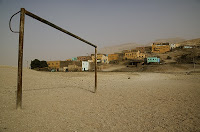Egypt
 Documentography
Documentography
See the above page for the full story.
- Mohammed's Old Gurna Home
http://www.youtube.com/watch?v=3iqWa01ekpA Many thanks to Ingeborg Waanders for the above video link on You Tube. It consists of footage of the house of one of Qurna's residents, in use by his family, and views of other areas of Qurna too. Due to...
- More Re Qurna Relocation
http://news.scotsman.com/international.cfm?id=504302007The Qurna issue just isn't going away: "The families have been resettled in a nearby new town with running water and telephones. But 80 are holding out, saying they want more from a government...
- More Re Eviction Of Qurna
http://news.independent.co.uk/world/africa/article2374347.ece"Slowly Qurna is being erased from the map. The process began last December after the Luxor authorities ordered the demolition of all the village's mud brick houses. 'In just five minutes,'...
- Bulldozers Have Moved In To Demolish Houses In Qurna
http://news.bbc.co.uk/2/hi/middle_east/6202342.stm"Bulldozers have moved in to demolish houses in the Egyptian village of Qurna which sits on top of dozens of pharaonic tombs in Luxor. The Egyptian government is determined to move the 3,200 families of...
- The Showman And The Archaeologist
The recent presentation by Caroline Simpson of the state of archaeology in Egypt has taken back a number of people though many realized the fate of the Qurna village was sealed a number of years ago but there was however a true belief that at least a...
Egypt
Qurna - The undesired tomb dwellers in egypt
 Documentography
Documentography Thanks very much to Ingeborg Waanders for this link. It is accompanied by some stunning photographs of Qurna (click on the link at the bottom of the above page to scroll through them).
We are standing in the interconnecting tombs beneath Mohammed Ismail’s house when he mentions the mummies, as one knew he would. The story of how the Abd el-Rassoul brothers discovered the “cachette” (everyone uses the French word) of bandaged pharaohs and flogged them off, confounding the authorities, is the defining narrative of this romantic and renegade community. “They are clever, they not tell anybody they find,” says Mohammed admiringly. “Forty mummies, necklaces, gold.”Mohammed Ismail, a congenial gent in a grey gallibayah and white headdress, and his neighbours are the last of a unique breed. They live in a village called Qurna, just a donkey dash from the Valley of the Kings in Egypt. Their houses are pharaonic-era tombs and they once traded in stolen antiquities and were experts in the manufacture of fake pharaonic treasures. Under cover of more legitimate touristic pursuits - the village receives a steady stream of Westerners visiting the 3,000-year-old Tombs of the Nobles, which are interspered among Qurna’s houses - some still cling to such practices. This year, after wishing them gone for a century or more, the Egyptian government finally decided to put an end to their anachronistic way of life by destroying their bizarre habitat and frogmarching them into the 21st century.
By the time you read this, almost the entire village of Qurna will have been razed to the ground and the villagers moved to an estate of brand-new bungalows three miles away on the edge of the Sahara Desert which has cost US$20 million. The houses they are leaving are strange, ramshackle affairs, sprouting from ancient tombs in agglomerations of mud-brick that barnacle the mountainside in shades of ochre and aquamarine. The ones they are going to are laid out in geometrical lines and have modern amenities - in particular, running water, a right denied the old village because piped water would have damaged the tombs.
See the above page for the full story.
- Mohammed's Old Gurna Home
http://www.youtube.com/watch?v=3iqWa01ekpA Many thanks to Ingeborg Waanders for the above video link on You Tube. It consists of footage of the house of one of Qurna's residents, in use by his family, and views of other areas of Qurna too. Due to...
- More Re Qurna Relocation
http://news.scotsman.com/international.cfm?id=504302007The Qurna issue just isn't going away: "The families have been resettled in a nearby new town with running water and telephones. But 80 are holding out, saying they want more from a government...
- More Re Eviction Of Qurna
http://news.independent.co.uk/world/africa/article2374347.ece"Slowly Qurna is being erased from the map. The process began last December after the Luxor authorities ordered the demolition of all the village's mud brick houses. 'In just five minutes,'...
- Bulldozers Have Moved In To Demolish Houses In Qurna
http://news.bbc.co.uk/2/hi/middle_east/6202342.stm"Bulldozers have moved in to demolish houses in the Egyptian village of Qurna which sits on top of dozens of pharaonic tombs in Luxor. The Egyptian government is determined to move the 3,200 families of...
- The Showman And The Archaeologist
The recent presentation by Caroline Simpson of the state of archaeology in Egypt has taken back a number of people though many realized the fate of the Qurna village was sealed a number of years ago but there was however a true belief that at least a...
